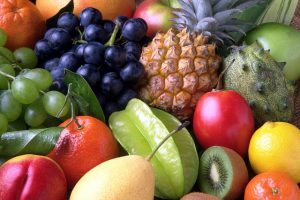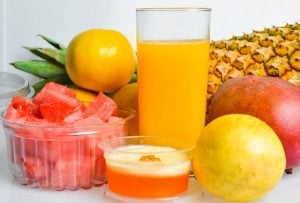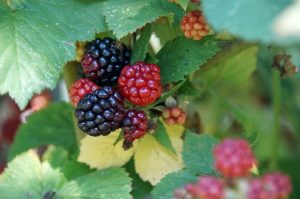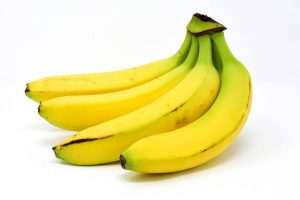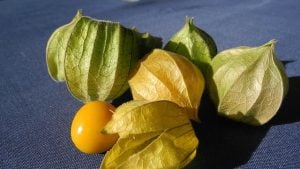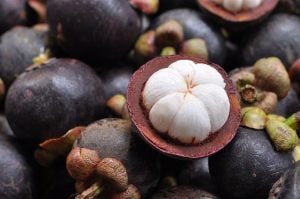The Kei Apple or Kayaba as it is locally known, is a shrub and fruit tree commonly planted as a hedge due to its thorny branches. The plant is native to Southern Africa and get its name from the Kei River in South Africa.
It’s also known by other names like Wild Apricot, Kai apple, Kau apple or Umkokola.
In many parts of Kenya, the Kei Apple is primarily used for fencing and can be found being sold as seedlings for just this purpose. But a close look at the shrub one can find the often inconspicuous and shy fruit which are green when unripe and bright yellow when ripe.
These little fruits are edible, however most people are not aware of this. The thorns could be to blame, as the fruits can be hard to reach to as well as see in the first place.
The Kei Apple fruit which is nearly round in shape with a tough outer skin, is juicy and acidic. This makes them quite tasty and refreshing. They’re usually eaten raw, but are reportedly even cooked in some parts.1 The high acidity also makes them suitable for preparing jams and jellies.2
Nutritient Content of the Kei Apple
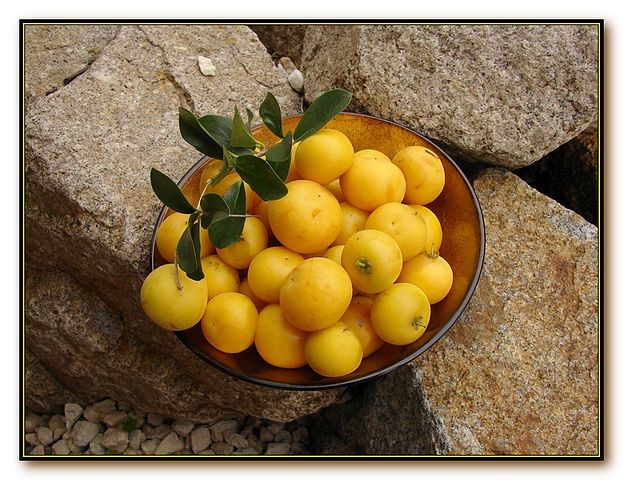
There’s little data on the nutrition value of Kei Apple fruits.3 Nevertheless, it’s known to be very rich in Vitamin C (Ascorbic Acid), with 100g of the fresh fruit providing about 83mg.3,4 Just to give you a perspective, let’s see how that compares with some common fruits (per 100g):
- Apple (with skin) – 4.6mg
- Oranges (all commercial varieties) – 53.2mg
- Lemon – 53mg
- Pineapples – 47.8 mg
- Passion – 30mg
- Pawpaw (Papaya) – 60.9mg
- Watermelon – 8.1mg
- Guavas – 228mg
Source: USDA National Nutrient Database
The fruit has also been shown to be high in polyphenols, with the Kei Apple juice providing twice the amount found in strawberry juice and almost four times that of orange and grape juice.3
Potential Health Benefits of Kei Apple Fruit
The potential health benefits of the Kei Apple lie in their high Vitamin C and Polyphenols content, both of which are good antioxidants.
Antioxidants are believed to play roles in disease prevention of diseases associated with free radicals like cancer, cardiovascular diseases and neurodegenerative diseases.3
Vitamin C is also essential for the body as its needed for healing wounds, repairing and maintaining bones and teeth and prevention of scurvy. Vitamin C also enhances the absorption of iron from the foods we eat, especially that from plant based foods like pulses.
Cultivation & Use
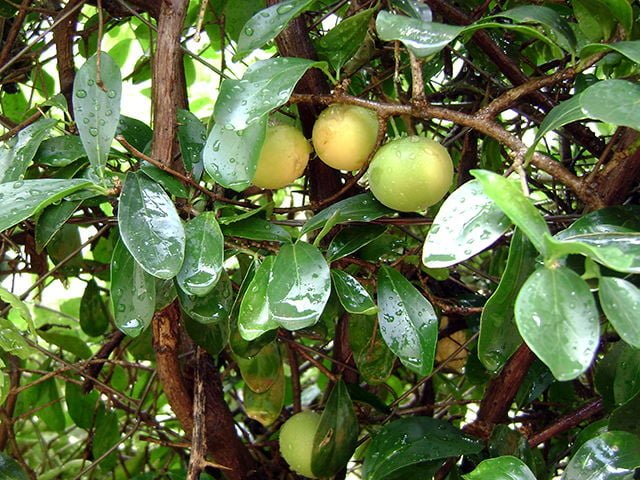
The Kei Apple plant is drought resistant and can also withstand low temperatures of up to below minus 6 degrees.
It can easily be planted from the seeds of its fruits and grows well in soils that wouldn’t support many other fruits trees. It also requires little management other than pruning and has minimal risk for pests and diseases.6
All this makes the plant ideal for many climates and from what we’ve seen, it clearly has the potential to not only improve nutrition but also be used for economic empowerment – it can be sold as fruit or even processed to make jams, jellies or juices.
So go on and treat yourself to the Kei Apple. Don’t just let it go to waste.
REFERENCES
1. Physicochemical characteristics of Kei Apple: A Proudly South African Fruit
(Available here: https://www.researchgate.net/publication/309212804_PHYSICOCHEMICAL_CHARACTERISTIQUES_OF_KEI_APPLE_A_PROUDLY_SOUTH_AFRICAN_FRUIT)
2. Every Thorn has its Rose: Kei Apple is both food and fence! (http://blogs.worldwatch.org/nourishingtheplanet/every-thorn-has-its-rose-kei-apple-is-both-food-and-fence-africa-agriculture-indigenous-vegetables-sandy-soil-drought-resistant-salt-resistant-antioxidant-vitamin-c-desertification-nourishing-the-plan/)
3. Polyphenol Composition and Antioxidant Activity of Kei-Apple
( Dovyalis caffra ) Juice (Available here: https://www.researchgate.net/publication/7299283_Polyphenol_Composition_and_Antioxidant_Activity_of_Kei-Apple_Dovyalis_caffra_Juice)
4. Fruit’s Info – Kei apple fruit (http://www.fruitsinfo.com/kei-apple.php)
5. Some investigations on the pectin and amino acid composition of Dovyalis caffra W. fruit (http://link.springer.com/article/10.1007%2FBF01092217)
6. Kei Apple (http://www.rarefruitclub.org.au/Level2/Dovyalis.htm)
